12 Best CRM Software for Startups to Scale in 2025
Finding the right CRM software for startups is a critical, yet often overwhelming, decision. Your customer relationship management tool is the central nervous system for your sales, marketing, and customer service efforts. For a growing business, it needs to be powerful enough to scale, affordable enough to fit a tight budget, and simple enough to implement without a dedicated IT department. A misstep here can lead to wasted resources, messy data, and missed opportunities. This guide is designed to cut through the noise and provide a clear, actionable roadmap.
We've compiled a comprehensive list of the top CRM platforms specifically suited for the unique challenges and opportunities that startups face. Instead of generic marketing descriptions, you'll find a detailed breakdown of what makes each tool a strong contender. We analyze key features, pricing structures (including free tiers and startup-friendly discounts), and practical use-case scenarios. Whether you're a B2B SaaS company managing a complex sales pipeline or a D2C brand looking to nurture customer loyalty, this resource will help you identify the perfect fit.
Each entry includes an honest assessment of its strengths and limitations, screenshots to give you a feel for the user interface, and direct links to explore further. We cover everything from all-in-one platforms like HubSpot and Zoho CRM to specialized tools like Streak for Gmail and Copper for Google Workspace users. This listicle will help you move beyond simple feature comparisons and select a CRM software for startups that will become a foundational asset for your company's growth. Let's dive into the options.
1. LeadSavvy Pro
LeadSavvy Pro presents a unique and powerful solution, particularly for startups whose growth strategy is heavily reliant on Facebook advertising. While not a traditional, all-encompassing CRM, it serves a critical, specialized function by automating the entire lifecycle of a Facebook lead. This platform is engineered to eliminate the manual, time-consuming process of downloading lead data, making it an indispensable tool for fast-moving sales and marketing teams.
For any startup leveraging Facebook Lead Ads, LeadSavvy Pro acts as the essential bridge between lead capture and a robust crm software for startups or even a simple Google Sheet. Its core function is to instantly and automatically sync new lead submissions from Facebook directly into your chosen destination, ensuring zero delay between a prospect showing interest and your team taking action.
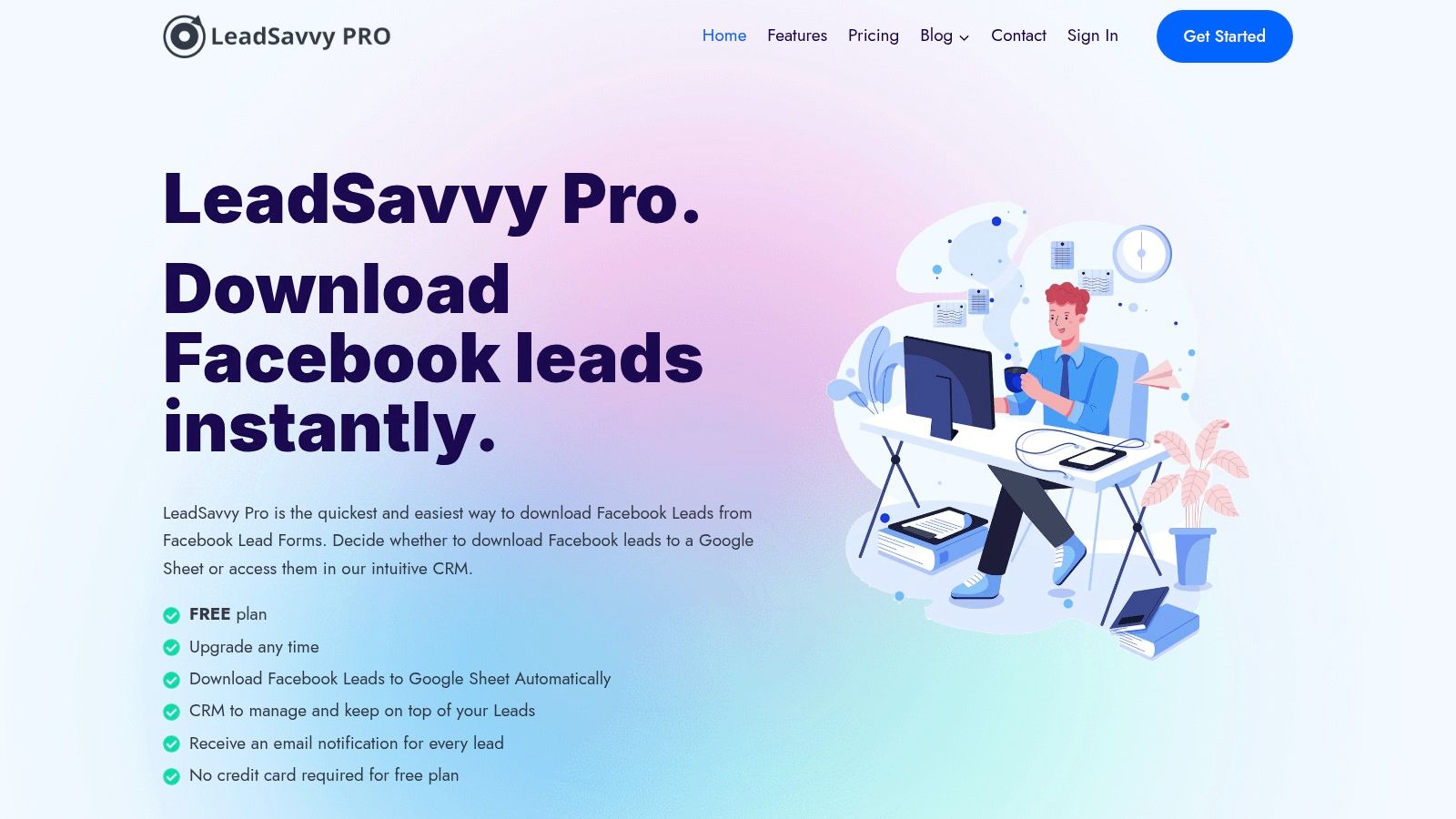
Why It Stands Out for Startups
LeadSavvy Pro’s strength lies in its focused simplicity and efficiency. It solves a very specific, yet common, bottleneck for startups: the delay and labor involved in handling leads from one of the most popular advertising platforms. The real-time email notifications are a game-changer, enabling immediate follow-up when a lead is at its warmest.
The platform's user-friendly interface, complete with guided setup and video tutorials, ensures that even non-technical founders can have it running in minutes. This accessibility is crucial for lean teams without dedicated IT support.
Key Features and Use Cases
- Automated Lead Sync: The primary value proposition. Connect your Facebook Page, and new leads are instantly sent to your Google Sheet or CRM. This removes the need to manually export CSV files daily, saving significant time and preventing leads from falling through the cracks.
- Real-Time Notifications: As soon as a lead submits their information, your designated team members receive an email. This is ideal for sales teams that need to act quickly to maintain high conversion rates.
- Centralized Lead Database: By funneling all Facebook leads into one place (like a master Google Sheet), startups can easily track campaign performance, analyze lead quality, and manage their sales pipeline without a complex setup.
- Scalable Pricing Model: Startups can begin with a generous free plan to validate its utility. As lead volume grows, the paid tiers offer advanced features and higher capacity, allowing the tool to scale with the business.
Implementation and Onboarding
Getting started with LeadSavvy Pro is straightforward. The process involves authenticating your Facebook account, selecting the Page you want to track, and then choosing your destination, whether it's a specific Google Sheet or a connected CRM. The guided process minimizes friction, and the optional video tutorial walks users through every step, ensuring a quick and successful implementation.
Website: https://leadsavvy.pro
2. HubSpot CRM (and HubSpot for Startups)
HubSpot is arguably one of the most recognizable names in the CRM space, and for good reason. Its platform is built around a powerful, permanently free Smart CRM core that allows startups to manage contacts, track deals, and log sales activities without any initial investment. This makes it an exceptionally low-risk entry point for new businesses looking to establish a single source of truth for customer data. The user interface is clean, intuitive, and designed for rapid team adoption with minimal training required.
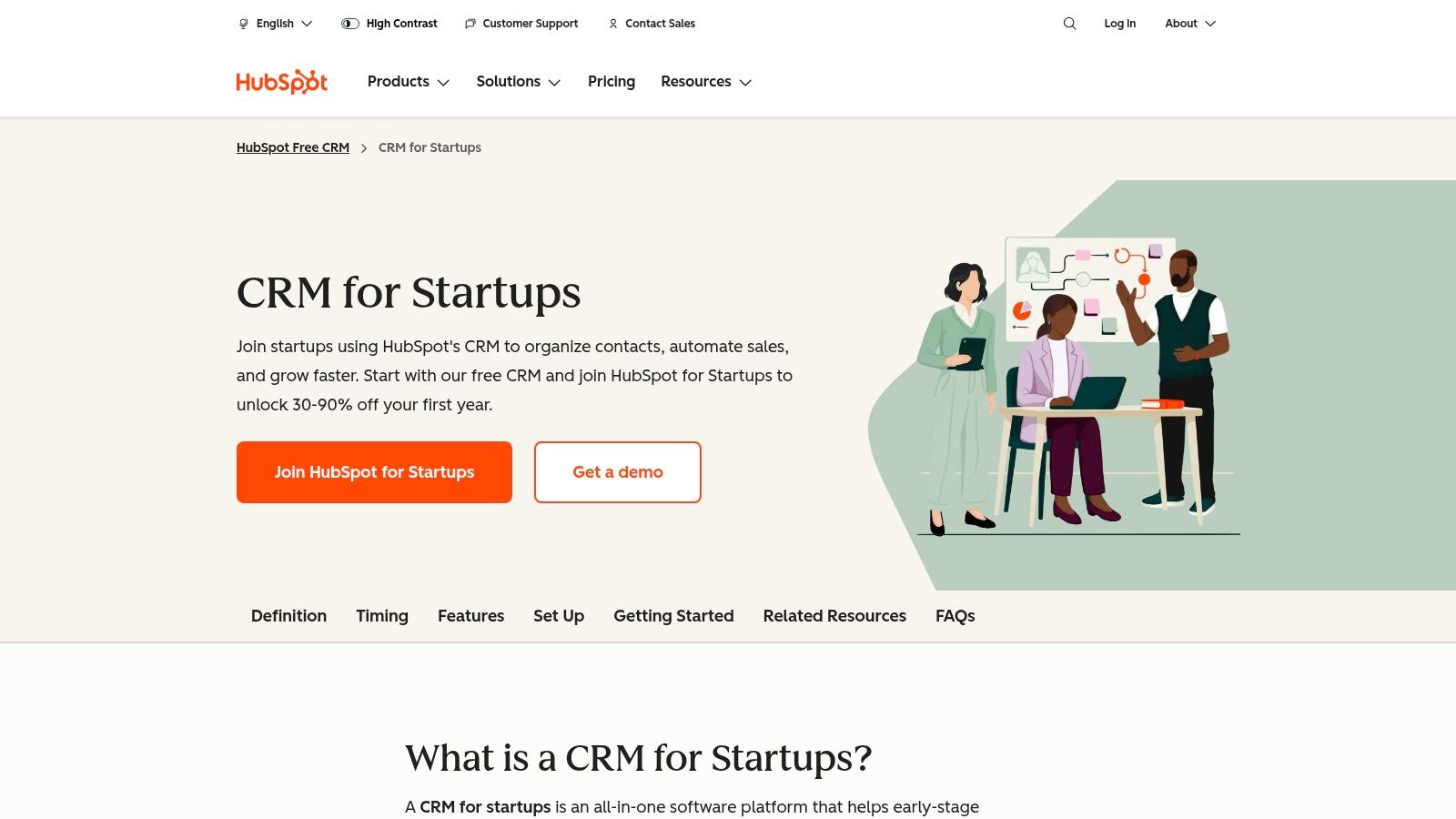
The real differentiator for early-stage companies is the HubSpot for Startups program. Eligible startups can receive substantial discounts, often ranging from 30% to 90% off, on the paid Sales, Marketing, and Service Hubs. This provides a clear, affordable path to scale. As your startup grows, you can add advanced functionality like marketing automation, detailed reporting, and customer service ticketing without needing a complex and costly data migration. For an in-depth look at its free capabilities, explore some of the best free CRM tools available.
Key Considerations
- Pricing: The core CRM is free forever. The HubSpot for Startups program offers significant first-year discounts on paid hubs, which otherwise start at around $45/month.
- Pros: The generous free tier is a huge advantage, and the all-in-one platform scales seamlessly. Its massive integration library (over 1,000 apps) ensures it connects with tools you already use.
- Cons: Costs can escalate quickly as you add more users or graduate from the startup program. Navigating the various hub packages and seat-based pricing can also become complex.
Website: https://www.hubspot.com/products/crm/startups
3. Salesforce Starter Suite (Salesforce for Small Business)
Salesforce is the undisputed titan of the enterprise CRM world, but its Starter Suite makes the platform accessible for startups wanting to build on a powerful foundation. This offering bundles core sales, marketing, and service features into a single, simplified application designed for small teams. It provides an enterprise-grade framework for managing leads, tracking opportunities, and engaging customers without the overwhelming complexity of its higher-tier editions. This makes it an ideal choice for founders who anticipate rapid scaling and want to adopt best-in-class infrastructure from day one.
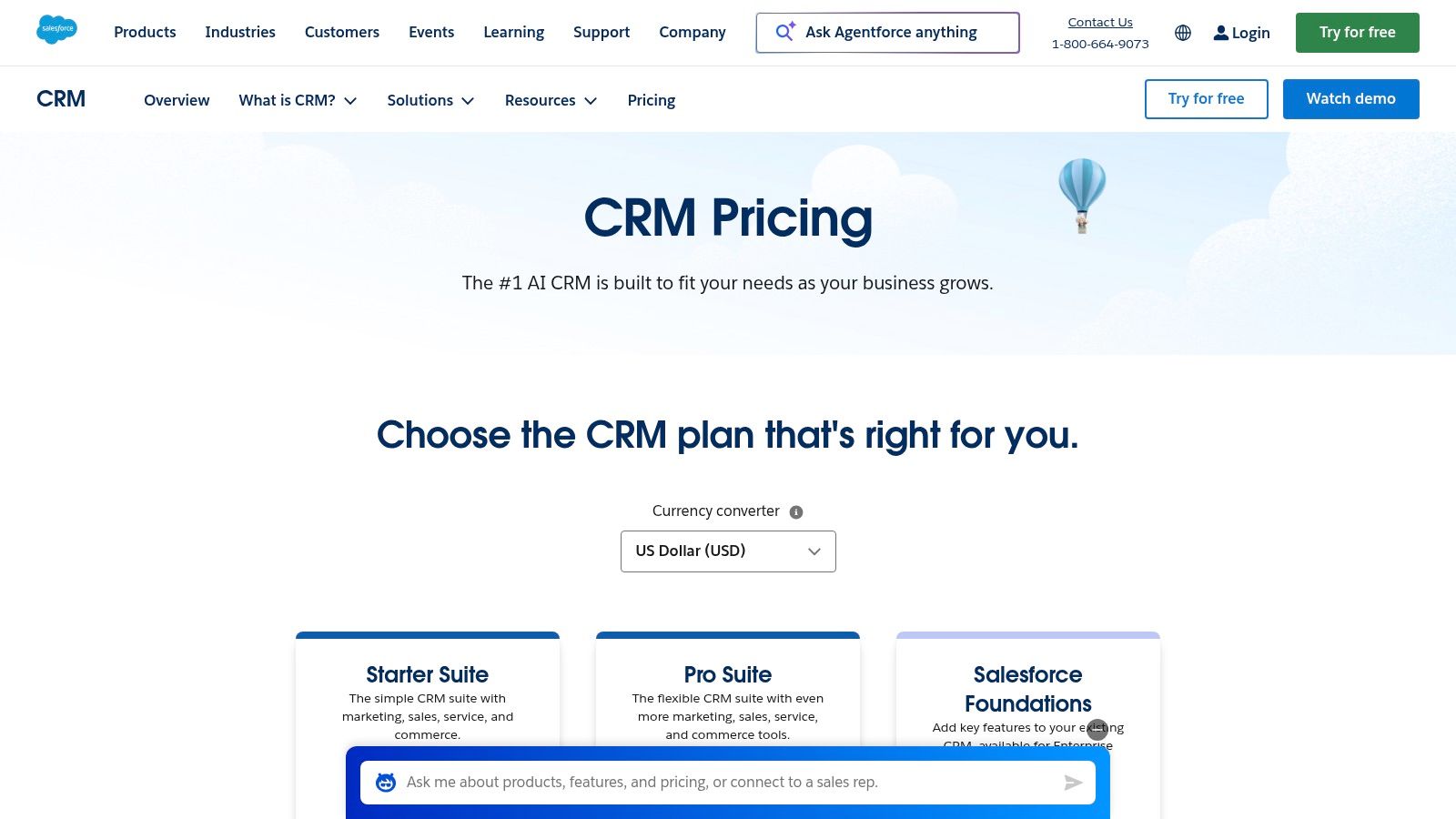
The primary advantage of starting with Salesforce is its unparalleled ecosystem and scalability. Even with the Starter Suite, you gain access to the vast AppExchange marketplace, allowing you to integrate specialized tools as your needs evolve. Guided onboarding and pre-built sales flows help new teams get up and running quickly. As your startup grows, you can seamlessly upgrade to more advanced Salesforce editions like Professional or Enterprise, ensuring your crm software for startups choice grows with you without requiring a painful data migration.
Key Considerations
- Pricing: The Starter Suite is priced at a flat $25 per user/month, with the flexibility of either monthly or annual billing.
- Pros: It provides access to a highly extensible and scalable platform from the start. The rare monthly billing option for an enterprise-level tool lowers the initial financial commitment.
- Cons: It requires more initial setup and configuration than simpler, out-of-the-box CRMs. Costs can escalate significantly when adding more users or upgrading to higher editions and add-ons.
Website: https://www.salesforce.com/crm/pricing/
4. Pipedrive
Pipedrive is a sales-first CRM built for one primary purpose: to help teams visualize and manage their sales pipeline with exceptional clarity. Its core strength lies in its intuitive, Kanban-style interface, which allows sales reps to drag and drop deals between stages. This visual approach makes it an outstanding piece of CRM software for startups that need their sales team to hit the ground running with minimal training and a clear, activity-based focus. It strips away the complexity of all-in-one platforms to concentrate on what moves the needle: closing deals.
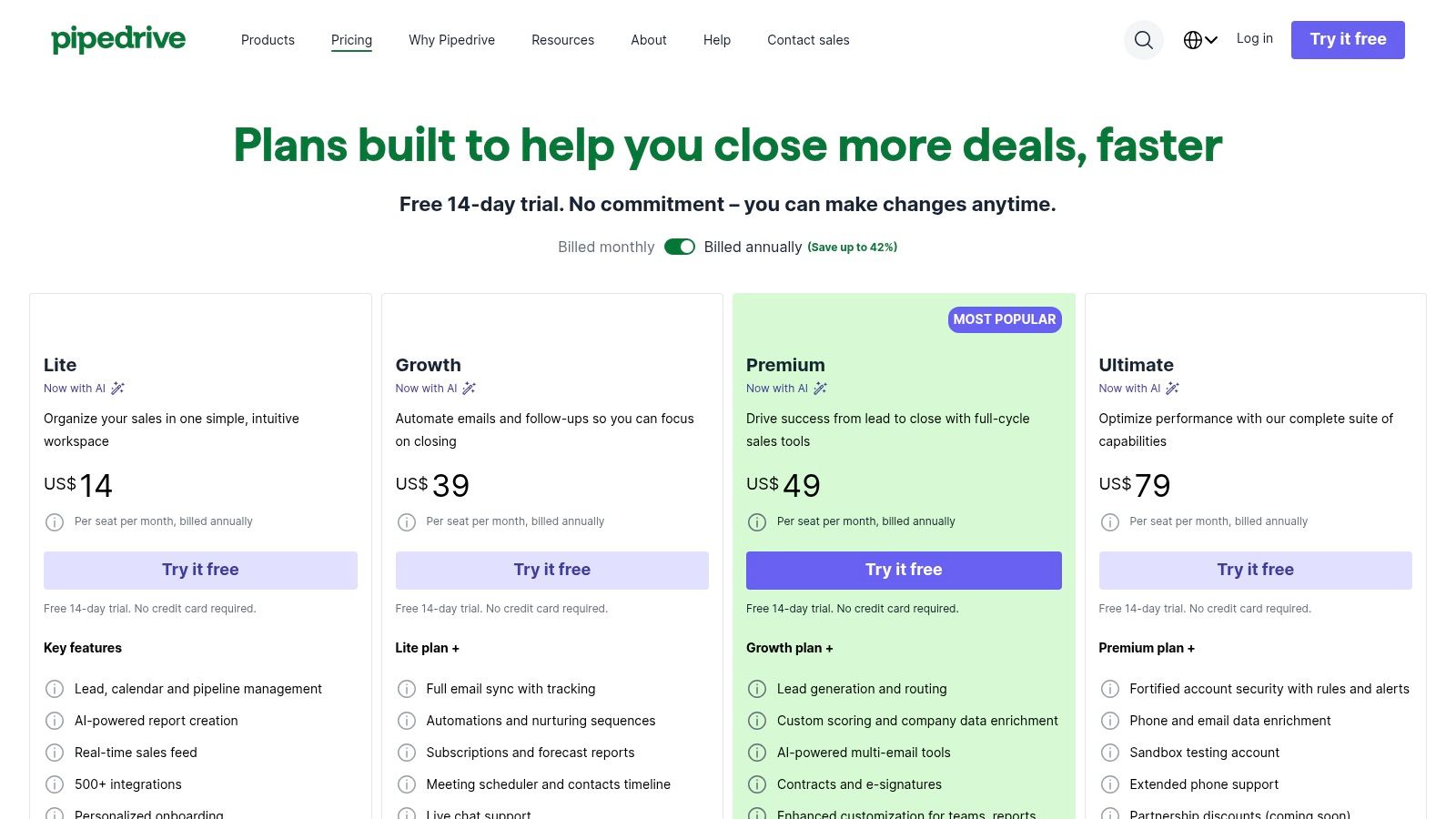
The platform is engineered for quick adoption and immediate impact. Startups can set up their entire pipeline in minutes and begin tracking communications, scheduling activities, and forecasting revenue. Pipedrive’s AI-powered Sales Assistant provides actionable tips and automates routine tasks, freeing up reps to focus on selling. With a marketplace of over 500 integrations, it connects seamlessly with the tools you already use, allowing you to build a tailored tech stack around a strong sales core rather than being locked into a single ecosystem. This makes it ideal for startups that prioritize sales velocity above all else.
Key Considerations
- Pricing: Plans start with the Essential tier at $14.90 per user/month. Higher tiers add automation, enhanced reporting, and customization. A 14-day free trial is available.
- Pros: The highly visual and user-friendly pipeline is best-in-class for ease of use. It offers a transparent, straightforward pricing model that is easy for startups to budget for.
- Cons: It is not an all-in-one suite. Marketing automation and customer service functionalities are limited, often requiring add-ons or integration with separate marketing tools for a complete solution.
Website: https://www.pipedrive.com/pricing
5. Zoho CRM
Zoho CRM stands out as a powerful, full-featured solution for startups that need robust functionality without a hefty price tag. As part of the extensive Zoho ecosystem, it offers an all-in-one platform that can grow with a business, from initial contact management to complex workflow automation. The platform is known for its impressive value, providing a deep feature set even in its lower-priced tiers, making it an excellent choice for budget-conscious startups seeking a scalable system. The free plan for up to three users is a perfect entry point for small teams.
What makes Zoho a compelling option is its ability to serve as a long-term partner. As your needs evolve, you can seamlessly integrate other Zoho apps like Zoho Books for accounting or Zoho Campaigns for email marketing, creating a unified business operating system. Higher tiers introduce Zia, an AI-powered sales assistant that provides predictions and suggestions. For those focused on lead generation, Zoho offers powerful tools to manage and nurture leads, which is a key aspect explored in this guide on CRMs for digital marketing. This makes it a top contender in the crm software for startups space.
Key Considerations
- Pricing: A generous free plan is available for up to 3 users. Paid plans are highly competitive, starting from around $14/user/month.
- Pros: Incredible value for the price, with a feature set that rivals more expensive competitors. The platform scales exceptionally well within the broader Zoho suite, and its mobile apps are mature and highly functional.
- Cons: The sheer number of features can be overwhelming for new users, leading to a steeper learning curve. The Zoho for Startups credit program is also limited to specific regions like India and MEA, making it less accessible globally.
Website: https://www.zoho.com/crm/
6. Freshsales by Freshworks
Freshsales (part of the Freshworks ecosystem) positions itself as an intelligent, all-in-one sales CRM that's exceptionally user-friendly for growing teams. Its main draw for startups is the consolidation of communication channels directly within the CRM. Freshsales comes with built-in phone, email, and chat functionalities, eliminating the need to piece together multiple third-party tools. This unified approach simplifies sales workflows and provides a complete, 360-degree view of every customer interaction without leaving the platform.
The interface is clean and modern, centered around a Kanban-style pipeline view that makes deal tracking intuitive. For startups looking for more than just a contact database, its AI-powered assistant, "Freddy," offers deal insights and lead scoring to help teams prioritize their efforts effectively. The availability of a free plan for up to three users makes it a zero-cost starting point for founders and very small teams, offering a genuine taste of its capabilities before committing to a paid plan.
Key Considerations
- Pricing: A free "Forever Free" plan is available for up to 3 users. Paid plans start at $15 per user/month, with a 21-day free trial on all tiers.
- Pros: The built-in communication suite (phone, chat, email) provides incredible value and simplifies the tech stack. Its user-friendly interface ensures quick adoption for new sales teams.
- Cons: While powerful, the most advanced AI features and granular user permissions are reserved for the higher-tier plans. Its integration marketplace is growing but is less extensive than those of giants like Salesforce or HubSpot.
Website: https://www.freshworks.com/crm/pricing/
7. Close
Close is a high-velocity sales CRM built for startups and SMBs that need to communicate with leads at scale. It consolidates outbound communication tools directly into the CRM, eliminating the need for separate dialing software, email clients, or SMS platforms. This all-in-one approach is perfect for founder-led sales or small, agile SDR teams, as it centralizes every call, email, and text message into a single, chronological timeline for each lead, providing complete context without switching tabs.
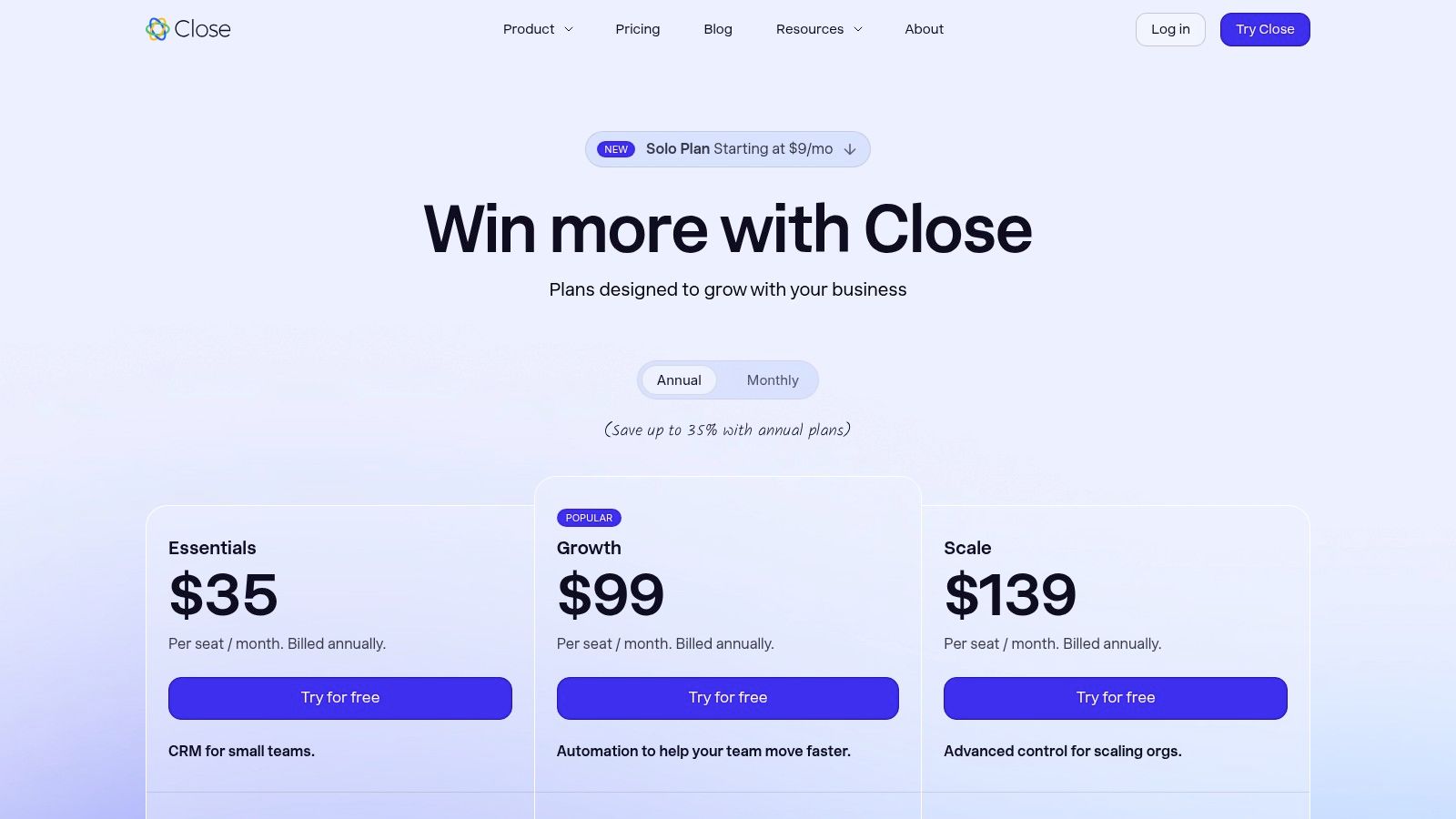
The platform's standout features are its native communication suite, including a Power Dialer for rapidly working through call lists, voicemail drop, and built-in global SMS. For startups focused on outreach-heavy sales motions, this tight integration dramatically improves workflow efficiency. The platform also offers an AI email assistant to streamline writing, supports multiple pipelines for different sales processes, and includes mobile apps for iOS and Android, making it a powerful piece of CRM software for startups on the go.
Key Considerations
- Pricing: Plans start with the "Startup" tier at $49/user/month (billed annually). All paid plans include unlimited contacts and leads. Phone and SMS usage are billed separately based on consumption.
- Pros: Reduces tool sprawl by combining core CRM functions with native phone, SMS, and email capabilities. Its transparent pricing and feature tables make it easy to choose a plan that scales with your team.
- Cons: The reliance on external tools for marketing automation beyond outbound sales may be a limitation for some. Additionally, the usage-based costs for calling and texting can accumulate quickly for high-volume teams.
Website: https://www.close.com/pricing
8. Streak (CRM for Gmail)
For startups that live and breathe inside Google Workspace, Streak offers a unique and powerful proposition: a CRM that operates entirely within your Gmail inbox. This eliminates the constant need to switch between your email and a separate CRM platform, saving valuable time and reducing friction in your daily workflow. It transforms your inbox into a flexible pipeline management tool, allowing you to track sales leads, support tickets, hiring candidates, and more directly from where your conversations happen.
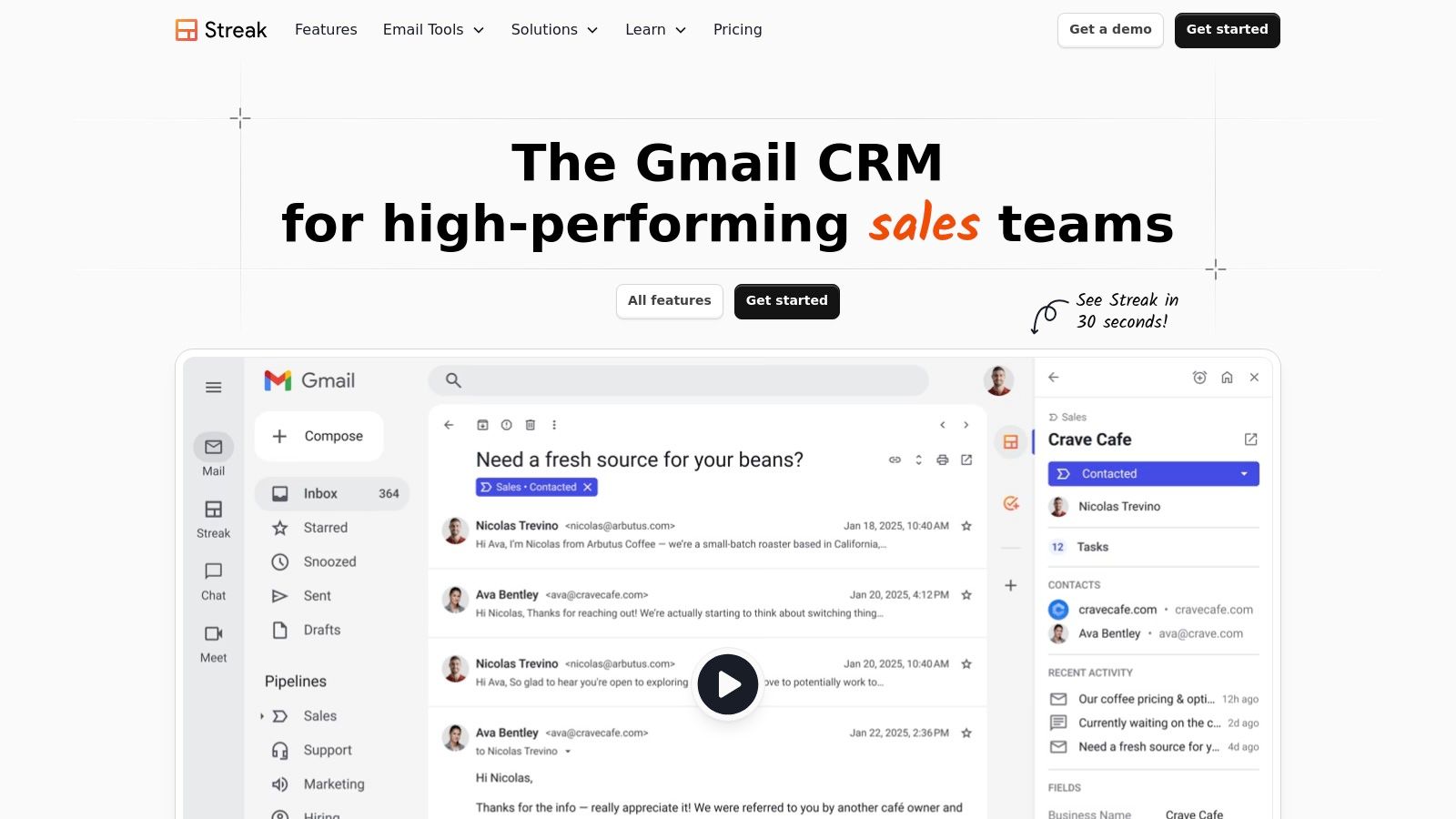
The platform's native integration means setup is incredibly fast, often taking just a few minutes via a Chrome extension. Core features like email tracking, mail merge, and shareable pipelines are built directly into the familiar Gmail interface, making adoption seamless for the entire team. Because it’s so deeply embedded in your inbox, it’s one of the most efficient tools for managing leads from various channels; some teams even find it an ideal CRM for tracking Facebook leads without a complex setup. To further streamline your workflow, exploring the best email management software for startups can complement Streak's capabilities perfectly.
Key Considerations
- Pricing: A limited free plan is available for personal use. Paid plans start at $15 per user/month, with more advanced features like shared pipelines and reporting on higher tiers.
- Pros: The biggest advantage is its zero-context-switching design for heavy Gmail users. It has a simple pricing structure and an incredibly low learning curve, promoting quick team adoption.
- Cons: Its strength is also its weakness; it's highly dependent on the Google ecosystem and less flexible for teams not centered on Gmail. Advanced automation and in-depth analytics often require upper-tier plans or third-party integrations.
Website: https://www.streak.com
9. monday sales CRM
monday sales CRM leverages the highly visual and flexible framework of monday.com's Work OS, transforming it into a powerful tool for sales teams. Its main appeal lies in its no-code customizability, allowing startups to build and adapt sales pipelines, contact databases, and deal management boards that perfectly match their unique processes. Instead of forcing you into a rigid structure, it provides building blocks like customizable columns, views, and dashboards to create a central hub for sales and light operational tasks.
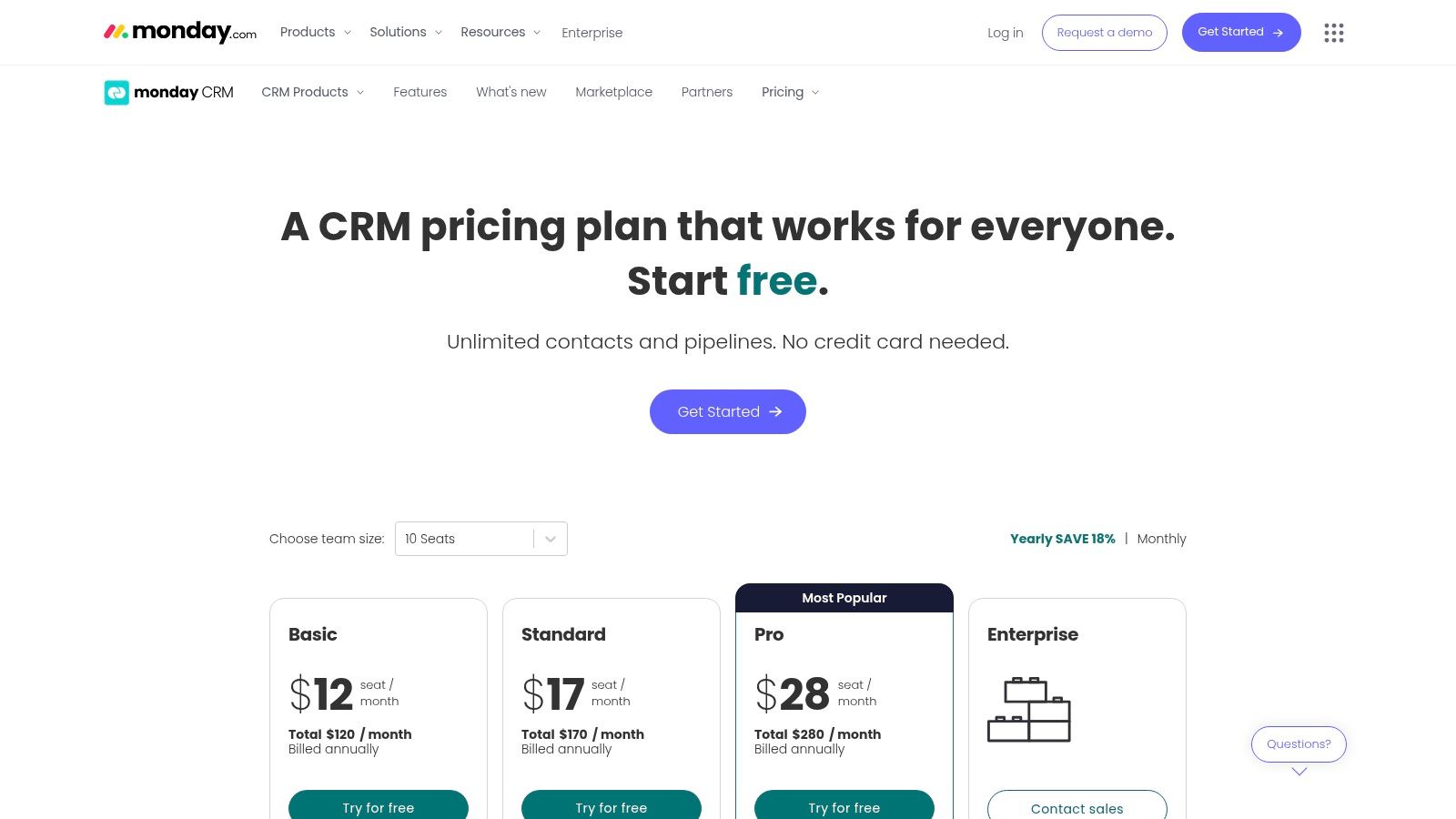
This platform excels for startups that need more than just a sales tracker; it’s a combined CRM and project management solution. You can manage lead flow, track communication with two-way email sync, generate quotes, and then seamlessly hand off a closed deal to an operations team using the same interface. This unified workspace reduces tool-switching and improves cross-departmental collaboration, making it a strong contender for startups looking for an all-in-one operational hub. As a flexible piece of CRM software for startups, it grows with your process complexity.
Key Considerations
- Pricing: Plans start at $10 per seat/month, but there is a mandatory three-seat minimum. This means the actual starting cost is closer to $30/month. A free plan is available with limited features.
- Pros: The platform is highly visual, intuitive, and extremely customizable. It serves well as a hybrid sales and operations hub, and the automation capabilities are powerful even on lower-tier plans.
- Cons: The three-seat minimum can be a barrier for solo founders or very small teams. Some critical sales features, like advanced analytics and lead scoring, are locked behind the more expensive Pro and Enterprise tiers.
Website: https://monday.com/crm/pricing/
10. Copper (Google Workspace-centric CRM)
For startups built entirely within the Google ecosystem, Copper presents a compelling and seamless CRM solution. Its core value proposition is its deep, native integration with Google Workspace, allowing teams to manage leads, contacts, and deals directly from their Gmail inbox. This eliminates the constant tab-switching and manual data entry that plagues many sales teams, creating an incredibly low-friction workflow. The platform automatically scrapes and organizes contacts, emails, and files from Gmail, making it a powerful choice for businesses that live and breathe Google's productivity suite.
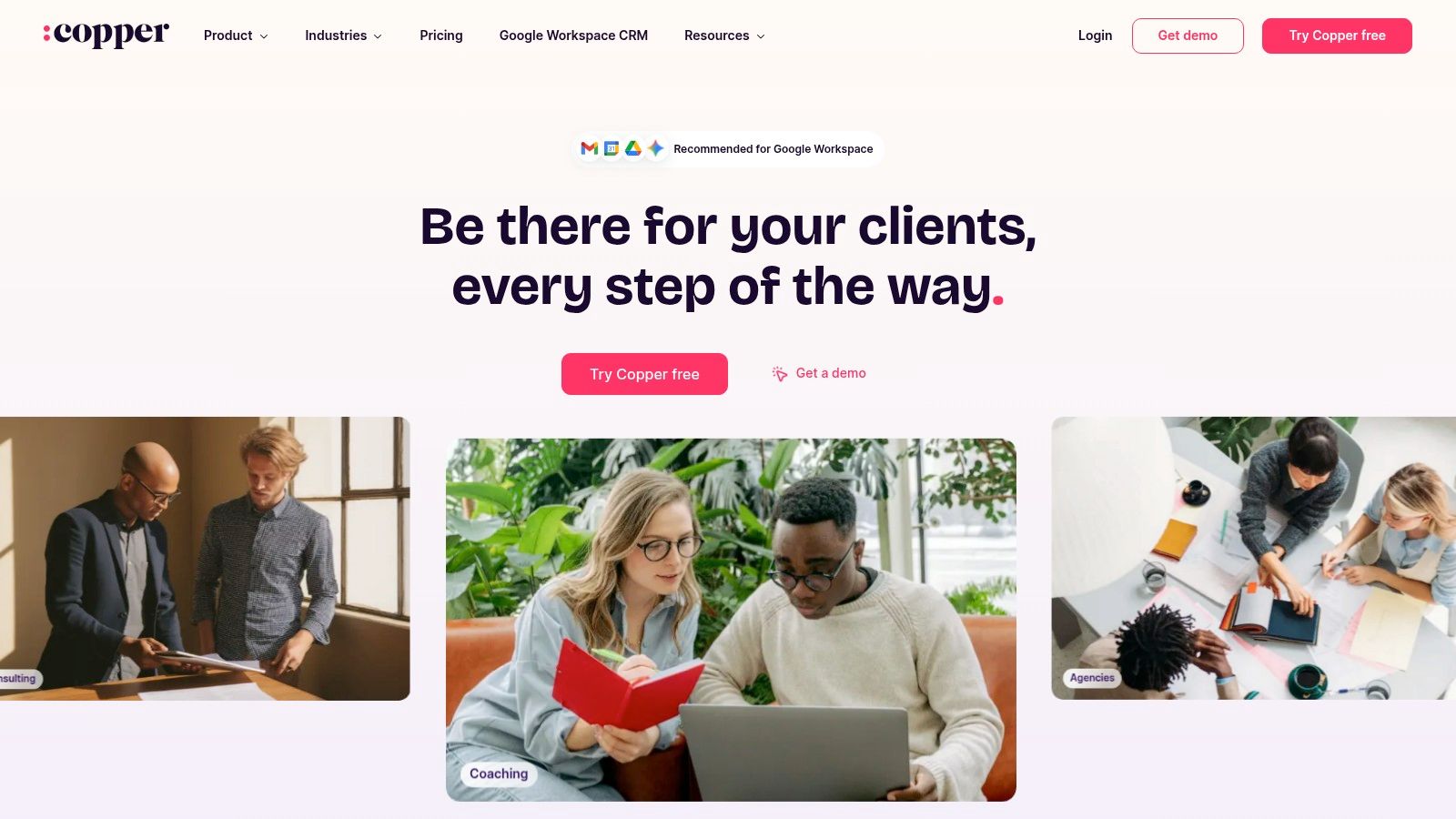
What makes Copper a standout option among CRM software for startups is its commitment to user adoption. Because it looks and feels like a part of Gmail and Google Calendar, the learning curve is minimal. The platform also offers a human-guided onboarding program for eligible new customers, ensuring that teams are set up for success from day one. This focus on a smooth implementation can be a game-changer for fast-moving startups that cannot afford significant downtime for training on complex systems.
Key Considerations
- Pricing: Starts with a Basic plan at $23/user/month (billed annually), with Professional and Business tiers offering more advanced features. A 14-day free trial is available.
- Pros: Unparalleled integration with Google Workspace minimizes administrative work and manual data entry. The user interface is highly intuitive for Google users, and the guided onboarding for new accounts is a significant plus.
- Cons: The tight Google integration means it's a poor fit for teams using other email clients like Microsoft Outlook. Its integration ecosystem is also smaller compared to larger players like HubSpot or Salesforce.
Website: https://www.copper.com
11. G2 (CRM Software category – comparison and buying)
While not a CRM platform itself, G2 is an indispensable resource for any startup navigating the complex process of selecting the right software. It's a leading B2B software marketplace that aggregates thousands of verified user reviews, allowing you to see how different CRM tools perform in real-world scenarios. For startups, this peer-to-peer insight is invaluable for validating vendor marketing claims and understanding potential pain points before committing to a platform.
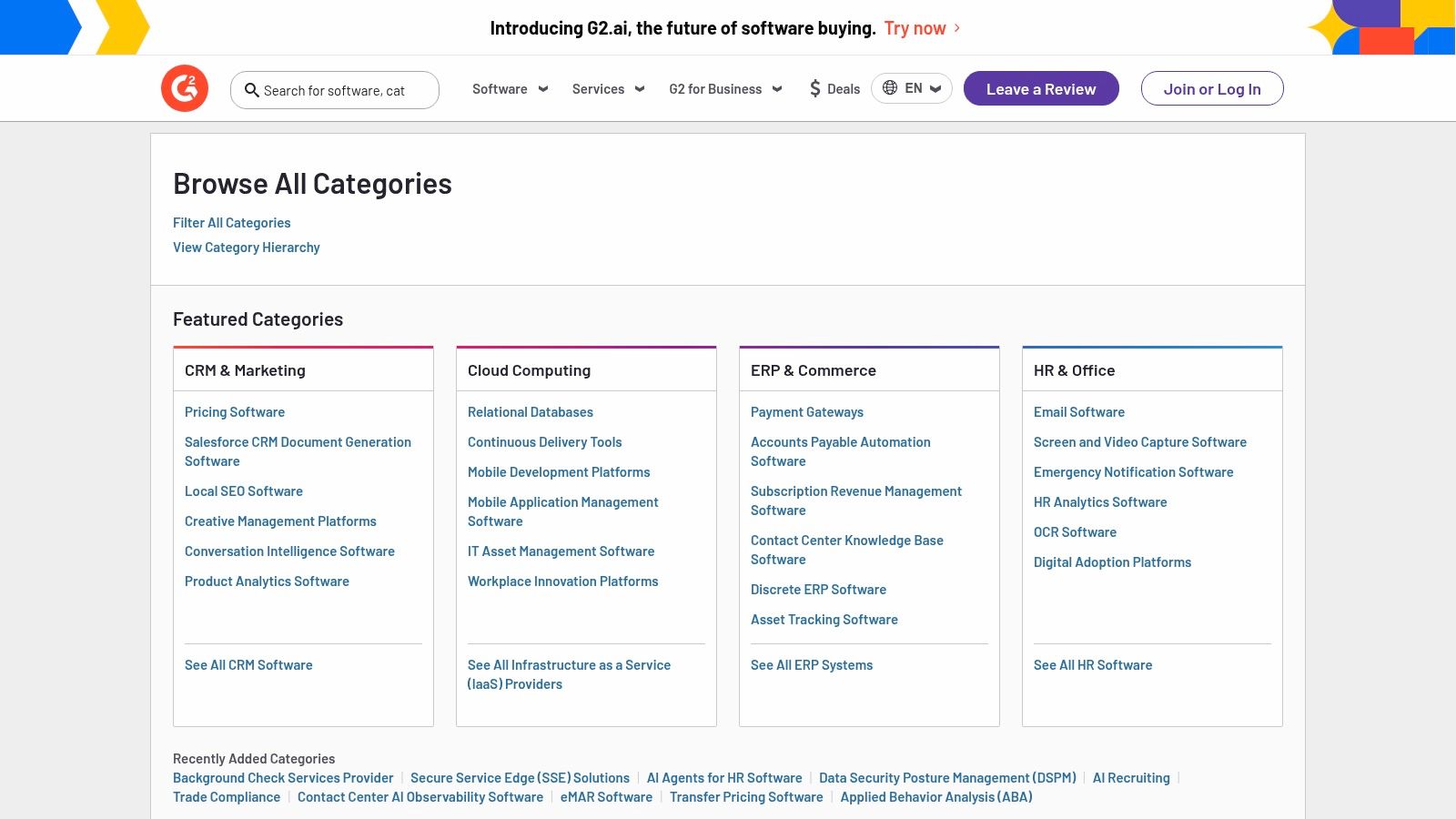
The platform’s strength lies in its detailed comparison grids and filtering capabilities. You can specifically search for crm software for startups, filter by company size, satisfaction ratings, and key features to create a personalized shortlist. G2 provides detailed buyer guides, up-to-date category rankings, and direct links to vendor websites for trials or pricing information. Using it as a research hub can save countless hours and help you make a more informed, data-driven decision rather than relying solely on a vendor's pitch.
Key Considerations
- Pricing: Free to use for research and comparison. You complete the actual software purchase directly with the CRM vendor.
- Pros: Access to a massive database of verified user reviews provides authentic feedback. The comparison tools and filters are excellent for narrowing down options based on specific startup needs.
- Cons: The ranking and visibility of some products can be influenced by sponsored placements. Since it's an aggregator, you still need to visit vendor sites for the most precise, up-to-the-minute pricing and feature details.
Website: https://www.g2.com/categories/crm
12. Capterra (CRM category – comparison and referrals)
While not a CRM platform itself, Capterra is an indispensable resource for finding the right CRM software for startups. As a leading software directory, it provides an exhaustive catalog of CRM solutions, allowing founders and operations managers to compare dozens of options in one place. Its strength lies in its powerful filtering tools, which let you narrow down the vast market by pricing model, specific features, deployment type (cloud or on-premise), and integration capabilities. This significantly reduces the time spent on initial market research.
Capterra aggregates user reviews and ratings, offering candid insights into the real-world performance and usability of different platforms. For startups, this peer-sourced information is invaluable for avoiding expensive mistakes. The site often compiles a "Shortlist" of top-performing products in the CRM category based on user interest and satisfaction, which serves as an excellent starting point for creating your evaluation list. You can directly access free trial sign-ups and demo requests from vendor pages, streamlining the selection process.
Key Considerations
- Pricing: Capterra's service is free for users. The platform generates revenue through vendor referrals and paid placements.
- Pros: It offers an extensive, filterable directory focused on SMB and startup needs. The wealth of user reviews and educational resources helps in making an informed decision without vendor bias.
- Cons: The sheer volume of options can be overwhelming. Be aware that vendor placements can influence visibility, so it's wise to use the filters to find less-promoted but potentially better-fit solutions.
Website: https://www.capterra.com/customer-relationship-management-software/
CRM Software for Startups: Key Features & Pricing Comparison
| Product | Core Features / Functionality | User Experience / Quality ★ | Value & Pricing 💰 | Target Audience 👥 | Unique Selling Points ✨ |
|---|---|---|---|---|---|
| LeadSavvy Pro 🏆 | Automates Facebook lead sync; real-time email alerts | Intuitive UI with guided setup; video tutorial | Free plan; scalable paid upgrades | SMBs, marketers, startups | Instant Google Sheets/CRM sync; no manual CSV; mobile ready |
| HubSpot CRM | Free smart CRM core; 1000+ integrations | Easy start; well-documented onboarding | Free core; startup discounts | Growing businesses; startups | Scales across sales, marketing, service; large ecosystem |
| Salesforce Starter Suite | Leads, email marketing, analytics; AppExchange access | Enterprise-grade; requires config effort | $25/user/month; monthly billing option | Small businesses; startups | Extensible platform; flexible billing |
| Pipedrive | Visual Kanban pipelines; 500+ integrations | Fast onboarding; clear pricing tiers | Transparent pricing; 14-day free trial | Startups; sales-focused teams | AI-assisted reporting; sales pipeline clarity |
| Zoho CRM | Free plan (3 users); AI assistant Zia; deep integrations | Mature mobile apps; robust reporting | Budget-friendly; multiple paid tiers | Startups; SMBs | Extensive customization; Google/Microsoft integration |
| Freshsales by Freshworks | Built-in phone, email, chat; AI assistant ("Freddy") | Strong all-in-one feel; easy channel integration | Free plan (3 users); paid upgrades | Early startups; sales teams | Native multi-channel sales communication |
| Close | Outbound sales focus; calling, SMS, email, dialers | Transparent plans; mobile apps | Usage-based phone/SMS fees | Founder-led sales; SDR/light sales teams | Combines CRM + telephony + SMS; predictive dialers |
| Streak (CRM for Gmail) | Native Gmail pipelines; mail merge; tracking | Minimal context switching for Gmail users | Simple pricing | Google Workspace users; small teams | CRM inside Gmail inbox; Chrome & mobile extensions |
| monday sales CRM | No-code customizable workflows; automation | Highly visual and customizable | 3-seat minimum; tiered pricing | Sales & operations teams; SMBs | Combines CRM with project ops; HIPAA on Enterprise tier |
| Copper (Google Workspace CRM) | Deep Gmail, Calendar, Drive integration | Low admin overhead; guided onboarding | Trial & promotions; pricing via sales | Google Workspace users; startups | Seamless Workspace integration; human onboarding |
| G2 (CRM category) | User reviews, rankings, filters | Aggregated peer feedback; up-to-date | Free; SaaS marketplace | SMB & enterprise software buyers | Verified reviews; buying guides; direct vendor links |
| Capterra (CRM category) | Large CRM catalog; user ratings & filters | Easy filtering tools; market insights | Free; vendor referral platform | SMB & startup CRM buyers | Extensive listings; price & feature filters |
Final Thoughts
Navigating the crowded landscape of CRM software for startups can feel overwhelming, but making an informed decision is one of the most impactful choices you can make for your company's future. We've explored a diverse range of platforms, from all-in-one powerhouses like HubSpot and Salesforce to hyper-focused solutions like Streak and Close. Each tool offers a unique approach to managing the lifeblood of your business: your customer relationships.
The central takeaway is that there is no single "best" CRM; there is only the best CRM for your specific startup. Your ideal choice hinges on a deep understanding of your team's workflow, your current tech stack, your budget constraints, and, most importantly, your strategic growth plans. A solution that’s perfect for a B2B SaaS company might be cumbersome for a direct-to-consumer brand, and vice versa.
Key Takeaways and Your Next Steps
Before you commit to a subscription, it’s crucial to take a step back and map out your path forward. This strategic pause will prevent costly migrations and implementation headaches down the road.
Here’s a simple framework to guide your decision-making process:
-
Define Your Core Needs, Not Your "Nice-to-Haves": What is the primary problem you are trying to solve right now? Is it disorganized lead management, a lack of sales pipeline visibility, or poor post-sale customer engagement? Focus on platforms that excel at solving that core issue first. Don't get distracted by a dozen features you won't use for another two years.
-
Audit Your Existing Workflow and Tools: Does your team live inside Gmail and Google Workspace? A CRM like Copper or Streak could offer the lowest adoption friction. Are you heavily reliant on social media marketing and content? HubSpot’s integrated Marketing Hub might be the most logical extension. Choosing a CRM that integrates seamlessly with your existing tools will save you countless hours.
-
Prioritize User Adoption: The most feature-rich CRM is useless if your team finds it too complex to use. During the free trial period, involve the actual end-users. Is the interface intuitive? Can they perform their essential daily tasks without extensive training? A simple, user-friendly CRM that gets used consistently will always outperform a complicated system that gathers digital dust.
-
Plan for Scalability: While you should buy for your needs today, you need to be aware of your potential needs tomorrow. Consider the platform's pricing tiers and feature gates. How much will it cost when your team grows from three reps to ten? Does the platform offer the advanced automation and reporting capabilities you'll need as you scale? Answering these questions now prevents being forced into a difficult migration later.
Implementation: The Final Frontier
Selecting your CRM is only half the battle. Successful implementation is what truly unlocks its value. Start small by focusing on one or two key processes, such as lead capture and pipeline tracking. Ensure your data is clean before migrating it, and provide your team with hands-on training focused on their specific roles.
Ultimately, the goal of any CRM implementation is to drive growth by turning raw data into actionable insights. To help understand the types of insights you can gain from your data, explore these 7 Examples of an Analytical Report to Drive Growth. This will help you visualize the end goal: a clear, data-driven understanding of your customer journey.
Choosing the right CRM software for startups is a foundational step in building a scalable, customer-centric organization. By focusing on your unique needs, prioritizing user adoption, and planning for the future, you can transform this decision from a daunting task into a strategic advantage that fuels your growth for years to come.
Ready to capture and convert leads directly from your Facebook Ads without the complexity of a massive CRM? LeadSavvy Pro is designed for startups and agencies that need instant lead notifications and seamless integration with their existing workflows. Get the leads you pay for, delivered right where you need them, instantly. Visit LeadSavvy Pro to see how you can stop losing leads today.







